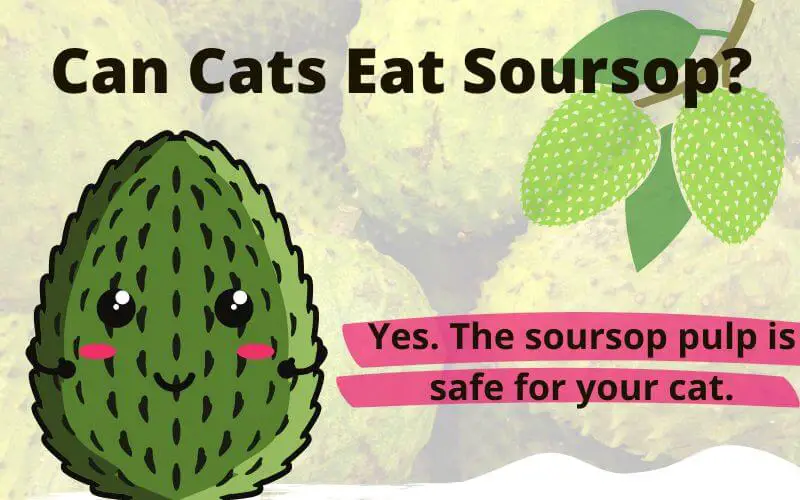Soursop is a tropical fruit species native to the Caribbean and America. It is popular among humans because of its digestive and health benefits, creamy texture, and citrusy flavor. Soursop, also known as Graviola, is a rich vitamin C, minerals, and potassium source. These compounds help maintain a healthy gut, immunity, and skin. Are you a cat owner wondering if cats can eat soursop?

Can Cats Eat Soursop?
The answer is yes. The soursop pulp is safe for your cat. However, consuming large amounts of soursop can lead to digestive issues. Additionally, the skin and seeds are not only toxic for your cat, but they can also cause intestinal obstruction and choking. Moreover, the leaves, bark, and other parts of the plant are also toxic for cats.
Read on to learn more about soursop for cats.
Is Soursop Safe For Cats?
Soursop is safe for your cat if you feed only the fruit’s pulp. Special attention is required to control the amount you feed your cat to avoid any health issues. It would be best to give soursop to your cat as an occasional treat. Eating large amounts of soursop may cause digestive issues in cats.
This fruit can be toxic not only for humans but also for cats. The seeds may cause a choking hazard and intestinal obstruction. Moreover, other parts of soursop are also not safe for cats and may cause toxicity. Despite the risks mentioned above, the fruit’s pulp is safe only in a regulated amount.
Is Soursop Bad For Cats?
Soursop is not completely bad for your cat. A few parts of soursop are safe for your cat, such as the creamy citrus pulp. But soursop can be bad for the cats if they eat the seeds, stem, leaves, bark, or the skin of the fruit or the plant. These parts are not only harmful to cats but also toxic to humans. A lot of research studies support these claims of soursop toxicity. Similarly, except for soursop pulp, all other parts are equally toxic for cats.
The consumption of these harmful parts may cause nerve damage and problems in movement. Its toxicity directly affects the liver and kidneys and may cause respiratory problems in cats. Research has found that the seeds may cause symptoms similar to Parkinson’s disease.
All the harmful effects and toxicity associated with soursop are due to alkaloids such as anoniine and anonaine. Researchers believe that toxic alkaloids such as medicine and muricinine are found in the bark. Moreover, unnamed alkaloids are present in the seeds and leaves of soursop, making them toxic.
The soursop seeds contain 45 percent non-drying yellow color oil, an irritating poison that can cause severe eye inflammation. The bark also contains hydrocyanic acid, which is very poisonous. However, only small amounts are found in the fruit and leaves.
Is Soursop Good For Cats?
Soursop is only good for your cat if it only consumes the pulp. Moreover, you need to give your cat a moderate amount of soursop once a month.
Although soursop is packed with various essential vitamins, minerals, and antioxidants, they are fruits that can only be digested and benefited from by humans.
Check can cats eat noni fruit
Cats are obligate carnivores, requiring a protein-based diet to fulfill their dietary needs. Protein-based diet includes your cat’s food or anything derived from meat. Fruits such as soursop do not fall in the protein-based food category, so it is okay for your cat to try it once or twice, but it will not be beneficial because it cannot digest it. Your cat’s digestive system is designed to digest and assimilate proteins and not the fruit-derived compounds.
Symptoms Of Soursop Poisoning In Cats
Soursop is a tropical delight but only for humans. If cats consume any part of the fruit or plant other than the pulp, they show signs of toxicity. The signs of toxicity include respiratory issues, nerve damage, difficulty in movement, choking and intestinal blockage. The consumption can also give rise to symptoms similar to Parkinson’s disease. Even if your cat eats the pulpy portion of the fruit but not in a moderate amount, it can upset the gut and cause diarrhea.
You can check can cats eat sapodilla
Some people drink tea made from the leaves of soursop fruit to treat breathing problems and infections. Make sure to keep it out of the reach of your cat because even one lick or sip can lead to toxicity in your cat.
FAQs
Can My Cat Eat Soursop Leaves?
No, soursop leaves are highly toxic because they contain alkaloids and neurotoxins. Take your cat immediately to the vet in case of consumption.
Can My Cat Drink Soursop Tea?
Soursop tea is dried from the plant’s highly toxic leaves that are not safe even for humans if consumed in large quantities. Make sure to consult with your physician before taking it. Keep your cats away from the soursop tea.
What Happens If My Cat Eats The Seeds Of Soursop?
Soursop seeds are highly toxic, just like the leaves, because of the presence of unnamed alkaloids and yellow oil, which act as an irritant poison. Interaction with this oil can lead to severe eye inflammation. Take your cat instantly to the vet if it eats seeds.
Find more here can cats eat quince
How Should I Feed Soursop To My Cat?
It would be best to avoid soursop entirely for your cat. But if you genuinely want your cat to enjoy this tropical delight, start by removing all the seeds. Only feed it one small spoon of the citrusy, creamy pulp.
Final Thoughts
Although the citrusy soursop’s pulp is safe for your cat, its excess can lead to digestive problems and diarrhea. The seeds of this fruit have harmful effects on your cat’s health. It would be best to avoid soursop altogether for your cat.
But if you want to feed soursop to your cat, do not overdo it. Keep it as an occasional treat that you may offer once every few months. Keep your cat away from the bark, leaves, and other parts of this plant, as they all can create toxicity.




